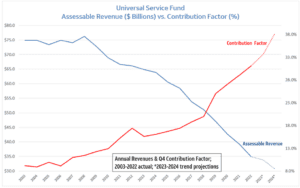Last week the Senate working group, tasked with assessing the FCC’s Universal Service Fund (USF), collected comments on what it should focus on when considering potential reforms for the program. While the working group itself is new, the debate on how to future-proof USF has been ongoing.
Created to further the longstanding bipartisan goal of ensuring that all Americans have access to affordable communications, the USF was established almost three decades ago and is comprised of four important connectivity programs: High Cost, Lifeline, E-Rate, and Rural Health Care. Each program has a different focus with the common goal of removing barriers to connectivity.
Establishing a Modern Funding Mechanism is Key
While the USF programs have expanded since their inception to focus on universal broadband, the way we pay for these programs is stubbornly stuck in the analog world of the 20th Century. Today’s USF funding mechanism was developed in a time where home phone service was the predominant method of communication. As a result, voice service revenues were – and continue to be – the primary means by which USF’s programs are funded.
With this outdated funding framework, a handful of companies and their customers provide nearly all of the funding for the USF. The proportional share that these few companies contribute has ballooned over time as demand for traditional voice services has declined relative to the explosion in demand for broadband internet access and other data services, services that have revolutionized the way Americans and the rest of the world communicate. In order to collect enough funding to support USF’s existing programs, the contribution factor has disproportionately increased by almost 400% to an absurdly high rate – from less than 6% in 2000 to approximately 30% today.

Despite the historical effectiveness of these programs, without a sustainable funding mechanism, the programs would be limited in meeting today’s universal service goals. The current USF funding mechanism is irrevocably broken and must change if we want to help communities across the country get access to high-speed internet.
Reforming the Contribution System
Everyone across the United States, including all businesses, rely on the availability of broadband. The most efficient and equitable way to reform USF funding and ensure that broadband benefits continue to be available to all, is through direct congressional appropriations. Rather than relying on a contribution system that is patently outdated and no longer fits the fund’s original scope and relies on a quickly vanishing revenue stream, Congress should secure annual appropriations that will support the USF programs in a fair, straightforward, and reliable way.
However, if ongoing direct appropriations are not possible, then we must fundamentally reconsider how universal service efforts are funded. Congress should provide the FCC with authority to expand the base of contributors to the USF fund to include the types of companies and services that most benefit from expanding broadband availability. Ubiquitous broadband availability isn’t just a bipartisan policy priority; it’s also a boon to the larger Internet economy. Therefore, Congress should follow the basic principle from when universal service was first conceived: the biggest winners in today’s internet ecosystem should lead the way in funding its realization.
Contributions from large technology companies, edge service providers, and others that directly benefit from the nation’s universal service goals will ensure the fund is big enough to continue to support American connectivity needs and the USF’s objectives.
Relying Solely on Broadband Revenue is Limiting
Some have suggested adding only broadband revenue to the contributions mechanism as the means to shore up USF into the future. This lone approach would be woefully shortsighted. Unlike other Internet ecosystem revenues, which continue to see amplified growth year-over-year, broadband revenues do not share the same rate of growth. Contributions based on broadband alone will not generate enough revenue to sustain the program into the future. What’s more, as compared to solutions that would broaden the contribution base to include ecosystem revenues, it would disproportionately shift the burden of supporting the program to consumer broadband customers, increasing bills for the very Americans we hope to connect. Such a myopic approach will not only dampen broadband adoption but will require us to revisit contribution reform far too soon.
Prioritizing Funding for Other Broadband Programs, Including ACP
Earlier this month the FCC announced that it’s helped over 20 million households get connected through the Affordable Connectivity Program (ACP). A huge win for narrowing the digital divide, the ACP’s success shows that a thoughtful, modern-day approach to universal service will help meaningfully expand broadband connectivity. Due to its soaring participation rates, experts caution that ACP funds will run out as early as the first half of next year. While ACP is not one of the four USF programs that the working group requested comment on – we encourage the working group to also support legislation to appropriate additional funding for ACP. If those options include incorporating the ACP into the USF, the need for fundamental contribution reform becomes even more urgent.
The Bottom Line
The working group has an exceptionally important task before it. The way we fund universal service programs must change in order to advance the program’s goals whether through direct appropriations from Congress or an expanded pool of USF contributors.
American households and businesses rely on broadband services to learn, work, and stay connected. Programs like the USF, which support these services, must evolve in the same way as broadband needs shift. Only with broad support through a modernized contributions mechanism can we ensure the USF makes good on its promise to get all Americans connected.





